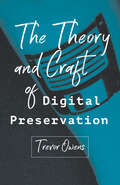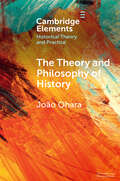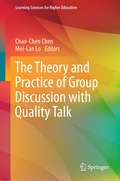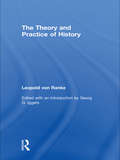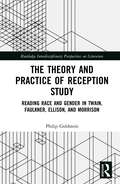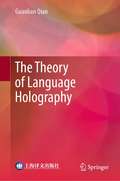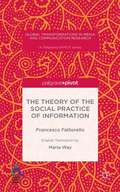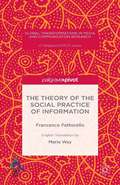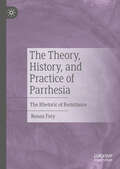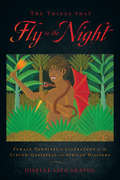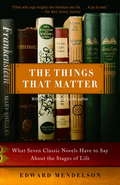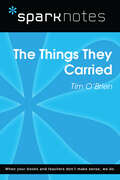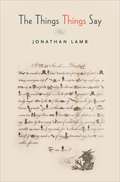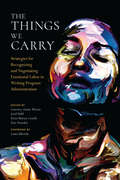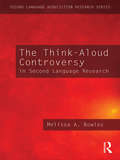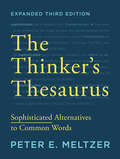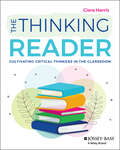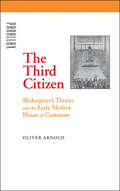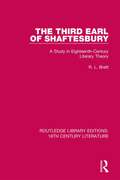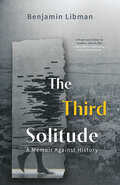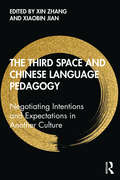- Table View
- List View
The Theory and Craft of Digital Preservation
by Trevor OwensA guide to managing data in the digital age.Winner of the ALCTS Outstanding Publication Award by the Association for Library Collections & Technical Services, Winner of the Waldo Gifford Leland Award by the Society of American ArchivistsMany people believe that what is on the Internet will be around forever. At the same time, warnings of an impending "digital dark age"—where records of the recent past become completely lost or inaccessible—appear with regular frequency in the popular press. It's as if we need a system to safeguard our digital records for future scholars and researchers. Digital preservation experts, however, suggest that this is an illusory dream not worth chasing. Ensuring long-term access to digital information is not that straightforward; it is a complex issue with a significant ethical dimension. It is a vocation.In The Theory and Craft of Digital Preservation, librarian Trevor Owens establishes a baseline for practice in this field. In the first section of the book, Owens synthesizes work on the history of preservation in a range of areas (archives, manuscripts, recorded sound, etc.) and sets that history in dialogue with work in new media studies, platform studies, and media archeology. In later chapters, Owens builds from this theoretical framework and maps out a more deliberate and intentional approach to digital preservation. A basic introduction to the issues and practices of digital preservation, the book is anchored in an understanding of the traditions of preservation and the nature of digital objects and media. Based on extensive reading, research, and writing on digital preservation, Owens's work will prove an invaluable reference for archivists, librarians, and museum professionals, as well as scholars and researchers in the digital humanities.
The Theory and Philosophy of History: Global Variations (Elements in Historical Theory and Practice)
by João OharaThis Element argues for a broad and inclusive understanding of the 'theory and philosophy of history', a goal that has proven elusive. Different intellectual traditions have competing, often incompatible definitions of what could or should count as proper 'theory/philosophy of history'. By expanding on the traditional versions of the 'history of the theory and philosophy of history' and including contexts from the Global South, particularly Latin America, the author hopes to offer a broader, more inclusive perspective on the theoretical reflections about history.
The Theory and Practice of Group Discussion with Quality Talk (Learning Sciences for Higher Education)
by Chao-Chen Chen Mei-Lan LoThis book explores the application of a significant discussion approach, Quality Talk, to English learning in Taiwanese college classrooms. Quality Talk has been found to successfully enhance students' reading comprehension and higher-level thinking in American contexts. It offers an introduction to Quality Talk and demonstrates how it can be implemented in college level English classes. It addresses students’ three levels of English proficiency: elementary, intermediate, and advanced. The respective chapters discuss a range of aspects: students' language proficiency levels, students' own viewpoints on the discussion approach, students' academic backgrounds, teaching materials, and culture-based learning. Readers will gain valuable insights into the Quality Talk approach and how it can be implemented in the classroom.
The Theory and Practice of History
by Leopold Von RankeThis collection of the writings of Leopold von Ranke was first published in 1973 and remains the leading collection of Ranke's writings in the English language. Now updated with the needs of current students in mind, this edition includes previously untranslated materials, as well as a new introduction by Georg G. Iggers.
The Theory and Practice of Reception Study: Reading Race and Gender in Twain, Faulkner, Ellison, and Morrison (Routledge Interdisciplinary Perspectives on Literature)
by Philip GoldsteinThis book examines novels of Faulkner and Morrison as well as Mark Twain and Ralph Ellison in order to show that their works forcefully undermine the racial and sexual divisions characterizing both the South and contemporary culture in the nineteenth and twentieth centuries. Moreover, the book discusses theories of reader-response and reception study and elaborates a theory of reception study based on the historical or "archeological" methods of Michel Foucault. As a consequence, unlike most studies of American literature, which discuss its historical contexts or prescribe its readers’ responses, this book explains the reception of these works, including the academic criticism and reviews and, because the internet exerts immense influence in the twenty-first century, the on-line responses of ordinary readers. Unlike most reception studies, this book examines the institutional contexts of the readers’ responses.
The Theory of Criticism: A Tradition and Its System
by Murray KriegerOriginally published in 1976. Representing years of critical reflection, The Theory of Criticism attempts to construct a poetics of "presence." Within a wide range of critical terminology, Murray Krieger has sought to create a new vision. In language that is passionate and often dramatic, he looks at the multidimensionality of the poetic world through the lens of Western poetics. His work clearly addresses itself to post–New Critical questions: how to preserve the literary object as a thing to be perceived, valued, and enjoyed and yet to account for its presence in, and interaction with, our culture as a whole, always in danger of being dissolved into man's language-making and -forming activity in general. Our awareness of the poem as object must be modified by our awareness that it is an "intentional" object. Krieger develops his balanced vision in three parts. Part 1 defines the problem and defends the very activity of theorizing both in its own terms and in terms of the critic's function throughout the history of Western criticism. By asking at the outset whether criticism is vain or valuable, Krieger already confronts the basic tension between system and world and the need to account for both. By creating a heuristic system that examines the possibility of form, the critic serves also the world of history and thought as a whole. Part 2 pursues that history from the classical encounter with mimesis in Greek thought to the Romantic and post-Romantic elevation of consciousness as a main criterion of poetic art. Defining a "humanistic aesthetic" as it has been viewed since Aristotle, the author shows how, during and after the eighteenth century, form was opened up under the impact of a Kantian and post-Kantian view, epitomized finally by Coleridge's imagination and its consequences for recent theorists. Part 3 deals with the image of the world struggling against its enclosure within a poetic context. It expands our view of metaphor as a reflection of the dual nature of poetic language, simultaneously locked into the poem and referring to history and nature outside. Our reading of the poem, Krieger concludes, must be double: we must see the poem as a linear and chronological sequence reflecting real life, and we must read it as a circular, imitative, mutually implicative mode.
The Theory of Descriptions
by Graham StevensThe book combines a historical and philosophical study of Russell's theory of descriptions. It defends, develops and extends the theory as a contribution to natural language semantics while also arguing for a reassessment of the important of linguistic inquiry to Russell's philosophical project.
The Theory of Language Holography
by Guanlian QianThis book presents a method of linking the ordered structure of the cosmos with human thoughts: the theory of language holography. In the view presented here, the cosmos is in harmony with the human body and language, and human thoughts are holographic with the cosmos at the level of language. In a word, the holographic relation is nothing more than the bridge by means of which Guanlian Qian connects the cosmos, human, and language. This is a vitally important contribution to linguistic and philosophical studies that cannot be ignored.The book has two main focus areas: outer language holography and inner language holography. These two areas constitute the core of the dynamic and holistic view put forward in the theory of language holography. The book’s main properties can be summarized into the following points: First and foremost, it is a book created in toto by a Chinese scholar devoted to pragmatics, theoretical linguistics, and philosophy of language. Secondly, the book was accepted by a top Chinese publisher and was republished the second year, which reflected its value and appeal. Thirdly, in terms of writing style, the book is characterized by succinctness and logic. As a result, it reads fluidly and smoothly without redundancies, which is not that common in linguistic or even philosophical works. Lastly, as stated by the author in the introduction, “Creation is the development of previous capacities, but it is also the generation of new ones”; this book can be said to put this concept into practice. Overall, the book offers a unique resource to readers around the world who want to know more about the truly original and innovative studies of language in Chinese academia.
The Theory of the Social Practice of Information (Global Transformations In Media And Communication Research)
by Francesco FattorelloThe Theory of the Social Practice of Information.
The Theory of the Social Practice of Information (Global Transformations in Media and Communication Research - A Palgrave and IAMCR Series)
by Francesco FattorelloIn this book, Fattorello addresses the differences between contingent and non-contingent information. The theory is translated into English for the first time and is contextualized and put into a historical framework by Prof. Ragnetti's additional text.
The Theory, History, and Practice of Parrhesia: The Rhetoric of Resistance
by Renea FreyThis book examines the theory, history, and practice of parrhesia—the act of speaking truth to power, when doing so is risky for the rhetor—and argues for a networked rhetorical approach to parrhesia that has not been considered previously by any other theorist. The goal of this book is to offer a reader-friendly explanation of this networked rhetorical approach to parrhesia, provide a genealogical account of the origins of parrhesia in the Classical age, and to show how parrhesia manifests today. This book is meant to give readers a functional manual for understanding, recognizing, analyzing, articulating, and using parrhesia.
The Thesis and the Book
by Siobhan Mcmenemy Eleanor Harman Ian Montagnes Chris BucciThe academic caveat Publish or Perish is not a new one, and for over a quarter of a century, The Thesis and the Book has come to the aid of graduate students in their quest for publication. The doctoral dissertation, usually the first book-length study completed by a scholar, is, however, only rarely publishable as a book. Understanding the differences between the two forms is a crucial part of one's education as a scholar and is equally important in appreciating the endeavours of scholarly publishers. The Thesis and the Book: A Guide for First-Time Academic Authors, revised and expanded in this second edition, will continue to provide the best overview of the process of revising a dissertation for publication.Drawing on the expertise of the contributors, all of whom are editors, publishers, and scholars themselves, the chapters present the rudimentary differences between a thesis and a book (including matters of purpose and audience), give guidance on the necessary stylistic, technical, and structural revisions to the dissertation, and offer advice to first-time authors who must not only revise their work to satisfy prospective publishers, but also learn a good deal of the ins and outs of scholarly publishing.The Thesis and the Book will continue to be of great value to graduating doctoral students seeking publication and to the faculty members who supervise these students. It will also be of value to acquisitions editors at scholarly presses, who must contend with the submission of revised dissertations for publication.
The Things That Fly in the Night
by Giselle Liza AnatolThe Things That Fly in the Night explores images of vampirism in Caribbean and African diasporic folk traditions and in contemporary fiction. Giselle Liza Anatol focuses on the figure of the soucouyant, or Old Hag--an aged woman by day who sheds her skin during night's darkest hours in order to fly about her community and suck the blood of her unwitting victims. In contrast to the glitz, glamour, and seductiveness of conventional depictions of the European vampire, the soucouyant triggers unease about old age and female power. Tracing relevant folklore through the English- and French-speaking Caribbean, the U.S. Deep South, and parts of West Africa, Anatol shows how tales of the nocturnal female bloodsuckers not only entertain and encourage obedience in pre-adolescent listeners, but also work to instill particular values about women's "proper" place and behaviors in society at large. Alongside traditional legends, Anatol considers the explosion of soucouyant and other vampire narratives among writers of Caribbean and African heritage who in the past twenty years have rejected the demonic image of the character and used her instead to urge for female mobility, racial and cultural empowerment, and anti colonial resistance. Texts include work by authors as diverse as Nobel Laureate Toni Morrison, U.S. National Book Award winner Edwidge Danticat, and science fiction/fantasy writers Octavia Butler and Nalo Hopkinson.
The Things That Matter
by Edward MendelsonShe felt rather inclined just for a moment to stand still after all that chatter, and pick out one particular thing; the thing that mattered . . . --Virginia Woolf,To The Lighthouse An illuminating exploration of how seven of the greatest English novels of the nineteenth and twentieth centuries--Frankenstein, Wuthering Heights, Jane Eyre, Middlemarch, Mrs. Dalloway, To the Lighthouse,andBetween the Acts--portray the essential experiences of life. Edward Mendelson--a professor of English at Columbia University--illustrates how each novel is a living portrait of the human condition while expressing its author's complex individuality and intentions and emerging from the author's life and times. He exploresFrankensteinas a searing representation of child neglect and abandonment andMrs. Dallowayas a portrait of an ideal but almost impossible adult love, and leads us to a fresh and fascinating new understanding of each of the seven novels, reminding us--in the most captivating way--why they matter.
The Things That Matter
by Edward MendelsonShe felt rather inclined just for a moment to stand still after all that chatter, and pick out one particular thing; the thing that mattered . . .--Virginia Woolf, To The LighthouseAn illuminating exploration of how seven of the greatest English novels of the nineteenth and twentieth centuries--Frankenstein, Wuthering Heights, Jane Eyre, Middlemarch, Mrs. Dalloway, To the Lighthouse, and Between the Acts--portray the essential experiences of life.Edward Mendelson--a professor of English at Columbia University--illustrates how each novel is a living portrait of the human condition while expressing its author's complex individuality and intentions and emerging from the author's life and times. He explores Frankenstein as a searing representation of child neglect and abandonment and Mrs. Dalloway as a portrait of an ideal but almost impossible adult love, and leads us to a fresh and fascinating new understanding of each of the seven novels, reminding us--in the most captivating way--why they matter.From the Trade Paperback edition.
The Things They Carried (SparkNotes Literature Guide Series)
by SparkNotesThe Things They Carried (SparkNotes Literature Guide) by Tim O'Brien Making the reading experience fun! Created by Harvard students for students everywhere, SparkNotes is a new breed of study guide: smarter, better, faster. Geared to what today's students need to know, SparkNotes provides: *Chapter-by-chapter analysis *Explanations of key themes, motifs, and symbols *A review quiz and essay topicsLively and accessible, these guides are perfect for late-night studying and writing papers
The Things Things Say
by Jonathan LambOne of the new forms of prose fiction that emerged in the eighteenth century was the first-person narrative told by things such as coins, coaches, clothes, animals, or insects. This is an ambitious new account of the context in which these "it narratives" became so popular. What does it mean when property declares independence of its owners and begins to move and speak? Jonathan Lamb addresses this and many other questions as he advances a new interpretation of these odd tales, from Defoe, Pope, Swift, Gay, and Sterne, to advertisements, still life paintings, and South Seas journals. Lamb emphasizes the subversive and even nonsensical quality of what things say; their interests are so radically different from ours that we either destroy or worship them. Existing outside systems of exchange and the priorities of civil society, things in fact advertise the dissident obscurity common to slave narratives all the way from Aesop and Phaedrus to Frederick Douglass and Primo Levi, a way of meaning only what is said, never saying what is meant. This is what Defoe's Roxana calls "the Sense of Things," and it is found in sounds, substances, and images rather than conventional signs.This major work illuminates not only "it narratives," but also eighteenth-century literature, the rise of the novel, and the genealogy of the slave narrative.
The Things We Carry: Strategies for Recognizing and Negotiating Emotional Labor in Writing Program Administration
by Courtney Adams Wooten Jacob Babb Kristi Murray Costello Kate NavickasEmotional labor is not adequately talked about or addressed by writing program administrators. The Things We Carry makes this often-invisible labor visible, demonstrates a variety of practical strategies to navigate it reflectively, and opens a path for further research. Particularly timely, this collection considers how writing program administrators work when their schools or regions experience crisis situations. The book is broken into three sections: one emphasizing the WPA’s own work identity, one on fostering community in writing programs, and one on balancing the professional and personal. Chapters written by a diverse range of authors in different institutional and WPA contexts examine the roles of WPAs in traumatic events, such as mass shootings and natural disasters, as well as the emotional labor WPAs perform on a daily basis, such as working with students who have been sexually assaulted or endured racist, sexist, homophobic, and otherwise disenfranchising interactions on campus. The central thread in this collection focuses on “preserving” by acknowledging that emotions are neither good nor bad and that they must be continually reflected upon as WPAs consider what to do with emotional labor and how to respond. Ultimately, this book argues for more visibility of the emotional labor WPAs perform and for WPAs to care for themselves even as they care for others. The Things We Carry extends conversations about WPA emotional labor and offers concrete and useful strategies for administrators working in both a large range of traumatic events as well as daily situations that require tactical work to preserve their sense of self and balance. It will be invaluable to writing program administrators specifically and of interest to other types of administrators as well as scholars in rhetoric and composition who are interested in emotion more broadly.
The Think-Aloud Controversy in Second Language Research (Second Language Acquisition Research Series)
by Melissa A. BowlesThe Think-Aloud Controversy in Second Language Research aims to answer key questions about the validity and uses of think-alouds, verbal reports completed by research participants while they perform a task. It offers an overview of how think-alouds have been used in language research and presents a quantitative meta-analysis of findings from studies involving verbal tasks and think-alouds. The book begins by presenting the theoretical background and empirical research that has examined the reactivity of think-alouds, then offers guidance regarding the practical issues of data collection and analysis, and concludes with implications for the use of think-alouds in language research. With its focus on a much-discussed and somewhat controversial data elicitation method in language research, this timely work is relevant to students and researchers from all theoretical perspectives who collect first or second language data. It serves as a valuable guide for any language researcher who is considering using think-alouds.
The Thinker's Thesaurus: Sophisticated Alternatives to Common Words (Expanded Third Edition)
by Peter E. MeltzerWith over twenty percent more material, a must for any lover of distinctive words. This entertaining and informative reference features sophisticated and surprising alternatives to common words together with no-fail guides to usage. Avoiding traditional thesauruses' mundane synonym choices, Peter E. Meltzer puts each word--whether it's protrepic, apostrophize, iracund, or emulous--in context by using examples from a broad range of contemporary books, periodicals, and newspapers. His new introduction makes the case for why we should widen our vocabulary and use the one right word. This groundbreaking thesaurus remains a unique venture, one that enriches your writing while helping you find the perfect word.
The Thinking Reader: Cultivating Critical Thinkers in the Classroom
by Ciera HarrisConcepts, lesson plans, and strategies for making reading lessons work The Thinking Reader: Cultivating Critical Thinkers in the Classroom is the frazzled teacher's guide to setting up any grade 2-4 classroom for reading success. You won't find any busywork, condescending lectures, or boring worksheets in this book. Instead, you'll learn flexible reading strategies to blend into your lessons at the start of the school year that will support your students for years to come. This book also debunks old-school ideas about reading instruction and explains the concepts that you'll need to know as you help students build a foundation for their future as readers. Former elementary teacher and instructional coach Ciera Harris has achieved remarkable, replicable results with young readers, not with a rigid system or program, but with a new approach to thinking about reading. In this book, you'll learn why it makes sense to go beyond all the lessons of phonics, fluency, and vocabulary by making reading personal to each student. This easy-to-use approach has helped teachers across the country create a culture of reading within their classrooms, so students—even those that struggle the most with reading—can start view themselves as readers. Help students learn based on what interests them, as individuals, and watch budding readers bloom. Discover why reading is not a series of decoding skills, but a personal, powerful act of thinking Learn the steps to setting up your classroom for reading success at the beginning of the year Get engaging lesson plans and techniques for implementing primary reading strategies like schema, asking questions, metacognition, and so much more Overcome common roadblocks, including student resistance to reading With The Thinking Reader, elementary school teachers in grades 2-4 can build the ultimate framework for reading success.
The Third Citizen: Shakespeare's Theater and the Early Modern House of Commons (Parallax: Re-visions of Culture and Society)
by Oliver ArnoldThe new practices and theories of parliamentary representation that emerged during Elizabeth's and James' reigns shattered the unity of human agency, redefined the nature of power, transformed the image of the body politic, and unsettled constructs and concepts as fundamental as the relation between presence and absence. In The Third Citizen, Oliver Arnold argues that recovering the formation of political representation as an effective ideology should radically change our understanding of early modern political culture, Shakespeare's political art, and the way Anglo-American critics, for whom representative democracy is second nature, construe both. In magisterial readings of Titus Andronicus, Julius Caesar, Coriolanus, and the First Tetralogy, Arnold discovers a new Shakespeare who was neither a conservative apologist for monarchy nor a prescient, liberal champion of the House of Commons but instead a radical thinker and artist who demystified the ideology of political representation in the moment of its first flowering. Shakespeare believed that political representation produced (and required for its reproduction) a new kind of subject and a new kind of subjectivity, and he fashioned a new kind of tragedy to represent the loss of power, the fall from dignity, the false consciousness, and the grief peculiar to the experiences of representing and of being represented. Representationalism and its subject mark the beginning of political modernity; Shakespeare’s tragedies greet political representationalism with skepticism, bleakness, and despair.
The Third Earl of Shaftesbury: A Study in Eighteenth-Century Literary Theory (Routledge Library Editions: 18th Century Literature)
by R.L. BrettThe third Earl of Shaftesbury had generally been known as the forerunner of the Moral Sense school of philosophers in the eighteenth century. Surprisingly little attention had been paid to his importance for literature and yet undoubtedly this had been very great. Originally published in 1951, this study gives an account of Shaftesbury’s aesthetic and literary theory; his discussion of the imagination, ridicule, the aesthetic judgment and the sublime; and his anticipation of later writers such as Burke, Coleridge and Kant. It also considers Shaftesbury’s thought as part of the background of ideas in the Augustan period and his influence in such fields as literature, architecture and landscape gardening. In addition, the author assesses in more general terms Shaftesbury’s attempt to maintain a Platonic viewpoint that would be more congenial to poetry than Locke’s "new way of ideas".
The Third Solitude: A Memoir Against History
by Benjamin Libman“A frank love letter to modern Jewish life.” — MERVE EMRE, contributing writer, The New YorkerAn intimate memoir in essays seeking familial history and personal memory against the backdrop of the lost world of North American Jewry.What is the past? How can we let it speak on its own terms, without forcing it into the categories of history? In The Third Solitude, Benjamin Libman gathers and weaves the threads of multiple pasts — of his community, of his family, and of himself — in an attempt to escape the inadequate narratives around Zionism that he grew up with, and to create nothing short of a new paradigm. Across a series of interconnected memories, Libman leads us through the many fragments that make a life, unafraid to question deeply cherished beliefs about Jewish identity, and seeks to reconcile his own values with those inculcated in him. Along the way, he casts aside tired tropes and shores together the pieces of a new way of looking toward the future. The Third Solitude is a paean to the art of losing, and to the visions of the past that persist in the present..
The Third Space and Chinese Language Pedagogy: Negotiating Intentions and Expectations in Another Culture
by Xin Zhang; Xiaobin JianThe Third Space and Chinese Language Pedagogy presents the Third Space as a new frame through which foreign language pedagogy is conceptualized as a pedagogy of negotiating intentions and expectations in another culture. The field of Chinese as a foreign language (CFL) in the past decades has been expanding rapidly at the beginning and intermediate levels, yet it is lacking in scholarship on the true advanced level both in theory building and research-supported curriculum and material development. This book argues that it is time for CFL to go beyond merely satisfying the desire of gazing at the other, whether it is curiosity about the other or superiority over the other, to focusing on learning to work with the other. It reimagines the field as co-constructing a transcultural Third Space where learners are becoming experts in negotiating intentions and expectations in another culture. It presents a range of research-based CFL pedagogical scholarship and practices especially relevant to the advanced level and to the goal of enabling learners to go past fans or critics to become actors/players in the game of cross-lingual and intercultural cooperation.
